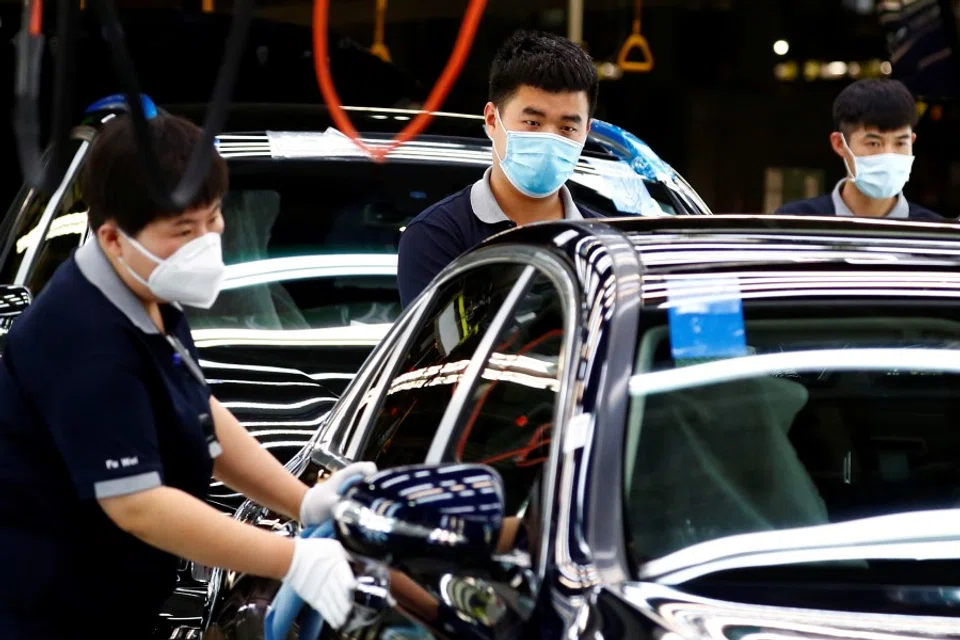Germany's China policy: Will economic interests override values?
Economics professor Zhu Ying notes that German Chancellor Angela Merkel holds a pragmatic approach towards China - specifically, economic interests come first. She has held on to that maxim despite questions from within and outside the government as to whether Germany should be tougher on China on matters that seem to run counter to their value system. In the face of mounting pressures in the wake of Covid-19 and developments in Hong Kong, can Merkel stay the course of balancing economic interests with values?

A key feature of German Chancellor Angela Merkel's policy towards China is that economic interests come first. Amid deteriorating China-US relations, China-Britain relations, and even China-EU relations, how the German government responds to China has become a crucial issue. The crux of the matter is the way Merkel balances Germany's economic interests with its value system.
First and foremost, Merkel, the German government and the business sector have certainly been thinking of China in terms of its economic interests. On 28 May, German newspaper Die Welt ran an article titled "German Economy Bowing to China", noting that since China rolled out the national security law for Hong Kong, Germany's economic sector has raised few objections.
When Germany's major business associations and the large businesses themselves are asked what they think of the national security law, they usually say little, while the Federation of German Industries (Bundesverband der Deutschen Industrie, BDI) says nothing at all. A spokesperson for Deutsche Bank replied, "We can only call on mainland China and Hong Kong not to escalate the situation and find a peaceful solution."
"The world must not be allowed to be divided into a Chinese and an American sphere of interest." - German Foreign Minister Heiko Maas
On 1 June, Der Spiegel reported that Merkel wanted to get closer to China. Germany takes over the rotating presidency of the Council of the EU on 1 July, and will set the tone for EU affairs in the six months after that. Although the event has been shelved recently, Merkel originally planned to hold a meeting of the leaders of the 27 countries of the EU with Chinese President Xi Jinping on 14 September in Leipzig.
Can Germany play mediator between the US and China?
In the Der Spiegel report, German Federal Minister for Economic Affairs and Energy Peter Altmaier indicated that Germany is not keen on the idea of decoupling from China. He said that in this connected and globalised time, isolationist measures cannot be effective. Norbert Röttgen, chairman of the Foreign Affairs Committee in the German Bundestag, also said isolating China would go against the interests of Germany and Europe.

On 31 May, German Foreign Minister Heiko Maas expressed the hope that while Germany holds the rotating EU presidency, it can mediate tensions between the US and China. "The world must not be allowed to be divided into a Chinese and an American sphere of interest," he said. Maas also called on China to safeguard Hong Kong's freedom of opinion and of assembly, but objected to resolving the Hong Kong issue by threatening China. Maas' comments objecting to global division is in line with Merkel's call not to fall back into a polarised world order.
As to the China-EU summit in Leipzig that Merkel had originally planned to hold in September, a spokesperson for Merkel said on 3 June that Europe and China had decided to cancel the summit, ostensibly due to the coronavirus. However, the German government later revealed to the media that Europe had postponed the summit due to difficulties with the agreement on bilateral investments between China and Europe.
On 11 June, during a video conference with Chinese Premier Li Keqiang, Merkel underlined the importance of establishing "an ambitious investment agreement between the EU and China" and raised "the need for further steps in market access, reciprocity and equal treatment of foreign companies", according to a statement by her spokesman.
Germany is, in fact, a major beneficiary of globalisation.
The focus of the disagreement is that the EU insists on getting China to open its market; it also wants to ensure that state-subsidised, state-owned China enterprises do not distort market competition. Merkel also raised the issues of human rights as well as Hong Kong - clearly, she appears to be balancing economic interests with values. (NB: In a statement on 17 June in which they underscored their "grave concern" about the law threatening Hong Kong's rights and freedoms, the foreign ministers of the G7, including Germany, had called for China to reconsider its decision on the national security law.)

Keeping globalisation alive
Second, Merkel, the German government and its business sector are thinking of China in terms of economic interests for the sake of its economy's globalisation needs. Germany is, in fact, a major beneficiary of globalisation.
Germany is the world's third largest exporter. In 2019, Germany exported goods valued at 1,327.6 billion euros. A report released in 2015 by the German Economic Institute (Institut der deutschen Wirtschaft, IW) showed that from 1995 to 2012, industrial-added value in Germany grew 37%; in comparison, that figure was around 3% for France and 9% for the UK, and -7% for Japan over the same period.
Merkel has visited China 12 times over 14 years, and economic issues have always been key topics for these visits.
Much of the success of German industry can be attributed to globalisation. The BDI feels Germany stands at the centre of Europe's industrial production network. According to the IW report, Germany's import rate for intermediate inputs increased from 27.7% to 34.6% between 2000 and 2011; intermediate inputs include all goods and services that are needed for production, such as raw, auxiliary and operating materials. China had the largest gain in its share of the global industrial value chain at 24.4%, while the US had a share of only 20%.
Germany is still very optimistic about the China market. Merkel has visited China 12 times over 14 years, and economic issues have always been key topics for these visits. According to data from Eurostat and Germany's Federal Statistical Office (Statistisches Bundesamt, Destatis), in 2019, goods worth 205.9 billion euros were traded between Germany and China, out of which Germany's exports to China amounted to 96 billion euros, making China Germany's most important trading partner for the fourth consecutive year. As of the end of 2018, Germany's direct investments in China amounted to 86 billion euros.
(Foreign Affairs Committee chairman Norbert Röttgen) warned that if they do not hold on to basic values such as the rule of law, freedom and democracy when dealing with China, their diplomatic integrity and influence would be damaged.
One popular story has it that when Merkel is on the road in China, she pays close attention to whether there are more Mercedes-Benzes, BMWs, and Volkswagens on the road. German car companies are now doing a lot in China's alternative fuel vehicle sector. First, Daimler AG - maker of Mercedes-Benz vehicles - revealed plans to invest in Chinese electric vehicle (EV) battery maker Farasis Energy's IPO; then, Volkswagen announced plans to purchase its Chinese EV joint venture partner JAC Motors' parent company, and also become the largest shareholder in Chinese battery maker Gotion High-tech. As for BMW, its fully electric iX3 is scheduled to enter production in late summer at its plant in Shenyang, a joint venture between BMW and local partner Brilliance.

Germany willing to stand apart
Third, Merkel will not be swayed in her approach to China by criticisms. On 12 June, Frankfurter Allgemeine Zeitung (FAZ) ran an interview with Röttgen, asking what Europe should do now that the image of the US is slipping in Germany, and China is expanding its influence.
Röttgen noted that in dealing with China, a systemic rival that actively promotes an alternative perspective of people and society, Germany should hold on to their belief in freedom of thought, which has been overlooked for a while. He warned that if they do not hold on to basic values such as the rule of law, freedom and democracy when dealing with China, their diplomatic integrity and influence would be damaged. Röttgen's comments actually represent Merkel's balance of economic interests with values, and show that Germany has not lost hold of its beliefs.
Germany is not the US; Germany does not insist that China democratise, nor does it seek to be a global "big brother".
In early June, Andreas Fulda, a China-Europe relations expert at the University of Nottingham, started a petition calling on the German government to change its approach of prioritising trade with China over human rights. He felt that Merkel's approach to China is almost all about Germany's economic interests, just like former Chancellors Gerhard Schröder and Helmut Kohl.
However, the fact is Germany's "change through trade" approach to China has failed, and China's economic modernisation has not brought political liberalisation and democratisation. That said, Germany is not the US; Germany does not insist that China democratise, nor does it seek to be a global "big brother". The benefits of Germany-China exchanges help Germany to prosper, so Germany does not feel that its interests are hurt by China's values.
Merkel's pragmatic China policy reflects the rationality of a determined people.
Merkel's China policy reflects the pragmatism of international relations: to gain an edge in the competition for survival, Germany has to keep growing its power and interests, which money can bring. China accepts that Western values will not bring money to Germany, despite the fact that Germany's wealth of thought and the values behind them are in fact the source of Germany's economic strength. Merkel's pragmatic China policy reflects the rationality of a determined people.



![[Photos] Fact versus fiction: The portrayal of WWII anti-Japanese martyrs in Taiwan](https://cassette.sphdigital.com.sg/image/thinkchina/3494f8bd481870f7c65b881fd21a3fd733f573f23232376e39c532a2c7593cbc)

